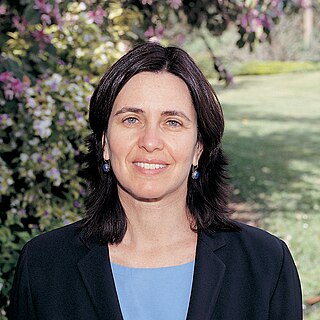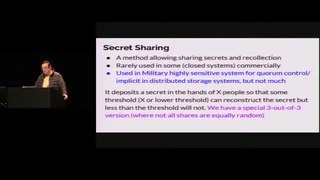
Home automation or domotics is building automation for a home. A home automation system will monitor and/or control home attributes such as lighting, climate, entertainment systems, and appliances. It may also include home security such as access control and alarm systems.

David Lee Chaum is an American computer scientist, cryptographer, and inventor. He is known as a pioneer in cryptography and privacy-preserving technologies, and widely recognized as the inventor of digital cash. His 1982 dissertation "Computer Systems Established, Maintained, and Trusted by Mutually Suspicious Groups" is the first known proposal for a blockchain protocol. Complete with the code to implement the protocol, Chaum's dissertation proposed all but one element of the blockchain later detailed in the Bitcoin whitepaper. He has been referred to as "the father of online anonymity", and "the godfather of cryptocurrency".
Ecash was conceived by David Chaum as an anonymous cryptographic electronic money or electronic cash system in 1982. It was realized through his corporation Digicash and used as micropayment system at one US bank from 1995 to 1998.
Zero-configuration networking (zeroconf) is a set of technologies that automatically creates a usable computer network based on the Internet Protocol Suite (TCP/IP) when computers or network peripherals are interconnected. It does not require manual operator intervention or special configuration servers. Without zeroconf, a network administrator must set up network services, such as Dynamic Host Configuration Protocol (DHCP) and Domain Name System (DNS), or configure each computer's network settings manually.
In cryptography, a zero-knowledge proof is a protocol in which one party can convince another party that some given statement is true, without conveying to the verifier any information beyond the mere fact of that statement's truth. The intuition underlying zero-knowledge proofs is that it is trivial to prove possession of the relevant information simply by revealing it; the hard part is to prove this possession without revealing this information.
LexisNexis is an American data analytics company headquartered in New York, New York. Its products are various databases that are accessed through online portals, including portals for computer-assisted legal research (CALR), newspaper search, and consumer information. During the 1970s, LexisNexis began to make legal and journalistic documents more accessible electronically. As of 2006, the company had the world's largest electronic database for legal and public-records–related information. The company is a subsidiary of RELX.

Shafrira Goldwasser is an Israeli-American computer scientist and winner of the Turing Award in 2012. She is the RSA Professor of Electrical Engineering and Computer Science at Massachusetts Institute of Technology; a professor of mathematical sciences at the Weizmann Institute of Science, Israel; the director of the Simons Institute for the Theory of Computing at the University of California, Berkeley; and co-founder and chief scientist of Duality Technologies.
Off-the-record Messaging (OTR) is a cryptographic protocol that provides encryption for instant messaging conversations. OTR uses a combination of AES symmetric-key algorithm with 128 bits key length, the Diffie–Hellman key exchange with 1536 bits group size, and the SHA-1 hash function. In addition to authentication and encryption, OTR provides forward secrecy and malleable encryption.
DigiCash Inc. was an electronic money corporation founded by David Chaum in 1989. DigiCash transactions were unique in that they were anonymous due to a number of cryptographic protocols developed by its founder. DigiCash declared bankruptcy in 1998 and subsequently sold its assets to eCash Technologies, another digital currency company, which was acquired by InfoSpace on February 19, 2002.
Non-interactive zero-knowledge proofs are cryptographic primitives, where information between a prover and a verifier can be authenticated by the prover, without revealing any of the specific information beyond the validity of the statement itself. This makes direct communication between the prover and verifier unnecessary, effectively removing any intermediaries.
Internet of things (IoT) describes devices with sensors, processing ability, software and other technologies that connect and exchange data with other devices and systems over the Internet or other communication networks. The Internet of things encompasses electronics, communication, and computer science engineering. "Internet of things" has been considered a misnomer because devices do not need to be connected to the public internet; they only need to be connected to a network and be individually addressable.
Privacy-enhancing technologies (PET) are technologies that embody fundamental data protection principles by minimizing personal data use, maximizing data security, and empowering individuals. PETs allow online users to protect the privacy of their personally identifiable information (PII), which is often provided to and handled by services or applications. PETs use techniques to minimize an information system's possession of personal data without losing functionality. Generally speaking, PETs can be categorized as either hard or soft privacy technologies.
ProVerif is a software tool for automated reasoning about the security properties of cryptographic protocols. The tool has been developed by Bruno Blanchet and others.
U-Prove is a free and open-source technology and accompanying software development kit for user-centric identity management. The underlying cryptographic protocols were designed by Dr. Stefan Brands and further developed by Credentica and, subsequently, Microsoft. The technology was developed to allow internet users to disclose only the minimum amount of personal data when making electronic transactions as a way to reduce the likelihood of privacy violations.
Do Not Track (DNT) is a formerly official HTTP header field, designed to allow internet users to opt out of tracking by websites—which includes the collection of data regarding a user's activity across multiple distinct contexts, and the retention, use, or sharing of data derived from that activity outside the context in which it occurred.

Mordechai M. "Moti" Yung is a cryptographer and computer scientist known for his work on cryptovirology and kleptography.
Zerocoin is a privacy protocol proposed in 2013 by Johns Hopkins University professor Matthew D. Green and his graduate students, Ian Miers and Christina Garman. It was designed as an extension to the Bitcoin protocol that would improve Bitcoin transactions' anonymity by having coin-mixing capabilities natively built into the protocol. Zerocoin is not currently compatible with Bitcoin.
Zero-Knowledge Systems was a Canadian privacy technology software and services company, best known for the Freedom Network, its privacy network. It was founded by brothers Austin Hill & Hamnett Hill and their father Hamnett Hill Sr. in 1997. Its headquarters were in Montreal, Quebec. Early investors and board members were Mike Santer and Alex Hern co-founder Inktomi. The company rebranded under the new name Radialpoint though was no longer a developer of privacy-enhancing technologies. Most recently, it was acquired by AppDirect and rebranded as AppHelp.

Firo, formerly known as Zcoin, is a cryptocurrency aimed at using cryptography to provide better privacy for its users compared to other cryptocurrencies such as Bitcoin.
Aggelos Kiayias is a Greek cryptographer and computer scientist, currently a professor at the University of Edinburgh and the Chief Science Officer at Input Output Global, the company behind Cardano.




